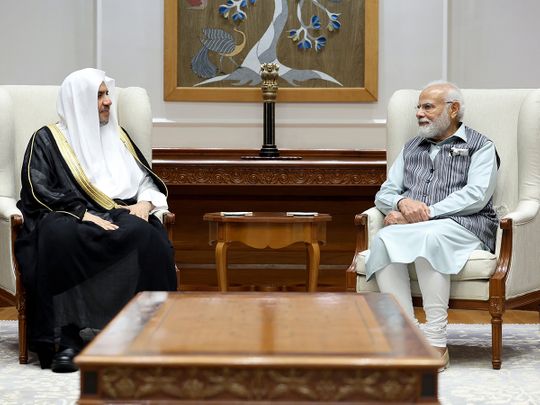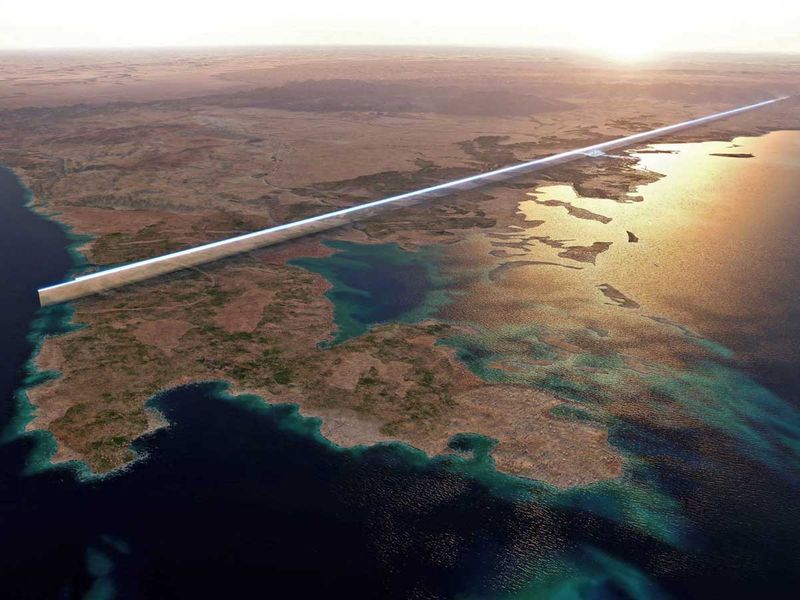
Prominent Islamic scholar and Secretary-General of the Muslim World League (MWL), Dr Mohammad bin Abdulkarim Al-Issa, concluded his historic five-day visit to India recently. The visit was aimed at enhancing interfaith dialogue, countering extremist ideologies, promoting global peace, and deepening the partnership between India and Saudi Arabia.
Al-Issa, born in 1965, holds a doctorate in comparative jurisprudence from Imam Muhammad ibn Saud Islamic University in Riyadh. He served as a judge at several courts in Saudi Arabia before becoming the minister of justice in 2009. He held this position until 2015, when King Salman bin Abdulaziz Al Saud appointed him as the head of MWL.
As the leader of MWL, Al-Issa has been promoting a message of moderation, tolerance, and dialogue among Muslims and with other faiths. He has visited several countries around the world to meet with religious leaders and communities from different backgrounds and sects.
In January 2020, Al-Issa led a historic delegation of Muslim leaders to Auschwitz-Birkenau, the former Nazi death camp in Poland, where more than one million Jews were killed during World War II.
He paid tribute to the victims of the Holocaust and condemned anti-Semitism and hatred. He also signed a memorandum of understanding with the American Jewish Committee to enhance cooperation and understanding between Muslims and Jews.
In July 2022, Al-Issa was appointed the Khateeb of Hajj, the preacher who delivers the sermon from the pulpit of Masjid Nimra in Arafat during the annual pilgrimage. This is considered one of highest honours in Islam. Al-Issa delivered a sermon that emphasised the unity, diversity, and solidarity of Muslims and called for peace, justice and coexistence among all people.
During his India visit, he not only held talks with the President, Droupadi Murmi, and the Prime Minister of India, Narendra Modi, but also external affairs minister S. Jaishankar. Al-Issa met with several other high-level dignitaries, intellectuals, and leaders of various religious and faith communities. Apart from the historic Jama Masjid, he was the first prominent Islamic theologian who, in recent times, visited the Akshardham Temple.
In his major address at the India Islamic Centre, Al-Issa appreciated India’s long history of diversity and respect for all faiths. Despite being a Hindu majority nation, India, he observed, has a secular constitution. He considered India as a great model of coexistence of diverse religious communities for the rest of the world. “Diversity,” he said, “is a great asset and it should never be left unutilised.”
In his response, Ajit Doval, the National Security Advisor, who spoke after him said, “Excellency your deep understanding of Islam, the religions of the world and incessant efforts towards interfaith harmony, courage to persistently lead on the path of reforms has not only contributed to a better understanding of Islam and its contribution to humanity but also prevented extremist and radical ideologies to plague the young mind.”
One earth, one family, one future
Doval added that India’s motto was vasudhaiva kutumbakam, “One earth, one family, one future. Either we stay together, or we are doomed. In the past, nations may have fought with each other. But this is no longer an age of war. Future battles for the good of humanity will have to respond against hunger and poverty.”
Al-Issa’s visit acquires added significance because he is considered one of the world’s leading authorities on Islam. What is more, he enjoys the full backing of Crown Prince Mohammad bin Salman, popularly known as MBS, who also serves as the prime minister of the Kingdom of Saudi Arabia.
Saudi Arabia is not only one of the largest, wealthiest, resource-rich, and most powerful states in the Middle East, a founding member of Opec, some of the world’s largest oil and gas reserves but is also the owner and home to the two holiest cities in the Islamic world, Mecca and Medina.

Widely regarded as a farsighted leader, MBS is determined to lead his country and the Arab world towards a new future. As part of his Vision 2030, MBS has initiated several reforms to liberalise Saudi society and culture.
He has lifted the ban on women driving, allowed cinemas and concerts to operate, curbed the power of the religious police, promoted moderation and interfaith dialogue, and cracked down on corruption and extremism.
He has also announced plans to build a futuristic city called NEOM on the Red Sea coast, which will be powered by renewable energy and will have its own laws and regulations.
Among his initiatives is his economic master plan, which, some say is modelled on the success of UAE, to diversify the Saudi Arabia away from oil dependence and modernise its society and culture. He also facilitated Saudi Arabia’s hosting of the G20 summit in 2020, the first time for an Arab country.
Given that over 650 million Muslims live in the subcontinent and another 250 million inhabit Indonesia, Malaysia, and other parts of eastern Asia, India can play an important role in the promotion of peacebuilding, coexistence, and moderation in all matters pertaining to the diverse faith traditions of the world. It would be a force for the good in the world.









